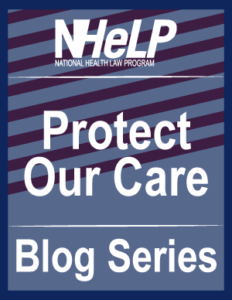 President Lyndon Johnson made the case for early childhood health care screening and treatment when he called on Congress to expand Medicaid services for children 40 years ago: “… the early years are the critical years… Our goal must be clear–to give every child the chance to fulfill his promise.” Those services, now known as Medicaid’s Early and Periodic Screening, Diagnostic, and Treatment (EPSDT) program, are designed to foster childhood growth and development so that children in low income families receive the health check-ups and treatments they need.
President Lyndon Johnson made the case for early childhood health care screening and treatment when he called on Congress to expand Medicaid services for children 40 years ago: “… the early years are the critical years… Our goal must be clear–to give every child the chance to fulfill his promise.” Those services, now known as Medicaid’s Early and Periodic Screening, Diagnostic, and Treatment (EPSDT) program, are designed to foster childhood growth and development so that children in low income families receive the health check-ups and treatments they need.
Children’s health care – why early detection and treatment is essential
Low income children are disproportionately affected by numerous health problems, such as elevated blood lead levels, vision, hearing, and speech problems, asthma, trauma, and behavioral/mental health issues. EPSDT services ensure that children do not needlessly suffer from health conditions that may be treatable and preventable. EPSDT ensures that children receive regular physical, mental health, vision, dental, and hearing screens and any necessary services to treat any condition or disease identified in these screens. Overall, EPSDT ensures that all children can access the health care services they need to be healthy, learn, grow, and thrive.
Medicaid provides children with periodic screening, vision, and hearing services, at regular intervals to help identify a range of health and developmental issues in children, from Autism Spectrum Disorder to hearing loss to signs of physical abuse. Any physical or mental illness or conditions identified must be then be diagnosed and treated. Under the “Treatment” requirement, Medicaid programs must “correct or ameliorate physical and mental illnesses and conditions” that are detected.
Medicaid now covers health services for nearly 36 million children living in or near poverty – 1 in every 4 children. Medicaid also serves as the health care lifeline for abused and neglected children placed in state foster care systems, children living with developmental and other disabilities, and children needing special education and other school-based health services.
Children’s health care threatened
However, the American Health Care Act (AHCA) would cut the Medicaid program by over $834 billion by imposing per capita caps and block grants and would increase the number of uninsured children by 50 percent. These cuts would threaten health services for children by reducing the amount of federal funding available to states to help provide essential health care services for vulnerable, needy children. With less money to take care of the same children, states would likely cut back children’s health care services, and place barriers on expensive specialty care for children with complex health needs, restricting access to care for the children who need it most.
Some suggest carving out certain populations, such as children with special health care needs, to prevent the harm of per capita caps. States, however, have historically had a hard time identifying children with special health care needs. Moreover, since states would see an overall reduction in federal funding under a per capita cap, even “carved out” populations would face reductions in services and eligibility.
Children of low income families have much to lose if AHCA is enacted. For more information, see NHeLP’s Protect Medicaid series, Issue Brief #1 Children’s Health.
Get involved!
Call your senators and urge them to vote against the AHCA. For more information on AHCA and its impact on the Medicaid program, sign up for our email list and follow us on Twitter and Facebook.

